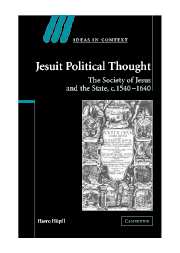Book contents
- Front Matter
- Contents
- Acknowledgements
- List of abbreviations
- Translations, references, and orthography
- Introduction
- 1 The character of the Society of Jesus
- 2 The Society's organisational ideas
- 3 The Society and political matters
- 4 The Church, the Society, and heresy
- 5 The confrontation with reason of state
- 6 Reason of state and religious uniformity
- 7 Jesuit reason of state and fides
- 8 Reason of state, prudence, and the academic curriculum
- 9 The theory of political authority
- 10 Limited government, compacts, and states of nature
- 11 The theory of law
- 12 The common good and individual rights
- 13 Tyrannicide, the Oath of Allegiance controversy, and the assassination of Henri IV
- 14 The papal potestas indirecta
- Conclusion
- Bibliography
- Index
- IDEAS IN CONTEXT
9 - The theory of political authority
Published online by Cambridge University Press: 22 September 2009
- Front Matter
- Contents
- Acknowledgements
- List of abbreviations
- Translations, references, and orthography
- Introduction
- 1 The character of the Society of Jesus
- 2 The Society's organisational ideas
- 3 The Society and political matters
- 4 The Church, the Society, and heresy
- 5 The confrontation with reason of state
- 6 Reason of state and religious uniformity
- 7 Jesuit reason of state and fides
- 8 Reason of state, prudence, and the academic curriculum
- 9 The theory of political authority
- 10 Limited government, compacts, and states of nature
- 11 The theory of law
- 12 The common good and individual rights
- 13 Tyrannicide, the Oath of Allegiance controversy, and the assassination of Henri IV
- 14 The papal potestas indirecta
- Conclusion
- Bibliography
- Index
- IDEAS IN CONTEXT
Summary
It seemed, therefore, that a right understanding of reason of state and political prudence presupposed a right understanding of the nature of political authority, potestas. But whereas there was an Aquinian paradigm for discussing laws, the nearest equivalent for potestas was some recent scholastic models, notably Vitoria's Relectio de potestate civili, first published in 1557 (though originally delivered in 1528), on which many Jesuits drew freely. It was not too difficult to find support in Aquinas himself for much that Jesuits wanted to say about potestas. The fact remains, however, that the Summa theologica Ia-2ae always discusses potestas under the heading of laws, rather than the other way around, and ordinarily refers not to the ruler but to the ‘legislator’. But for Jesuits, whereas potestas politica wholly encompassed law-making, the converse was not the case. Potestas therefore had logical as well as (so it seemed) chronological pride of place over laws. Arguably they took a quite different view of law and political obligation.
THE NATURE OF POTESTAS
In European vernaculars and colloquial Latin the same terms were casually used for both legitimate authority and might. In classical Latin potestas meant legitimate authority: there was a separate vocabulary to designate power without any connotation of right: potentia, vis, dominatio, coercitio, coactio. Modern writers sometimes used potestas legitima to avoid any confusion. Generically, potestas is any right (ius) or rightful capacity (facultas) to act. Ius in one of its senses and potestas are therefore interchangeable concepts.
- Type
- Chapter
- Information
- Jesuit Political ThoughtThe Society of Jesus and the State, c.1540–1630, pp. 186 - 223Publisher: Cambridge University PressPrint publication year: 2004



